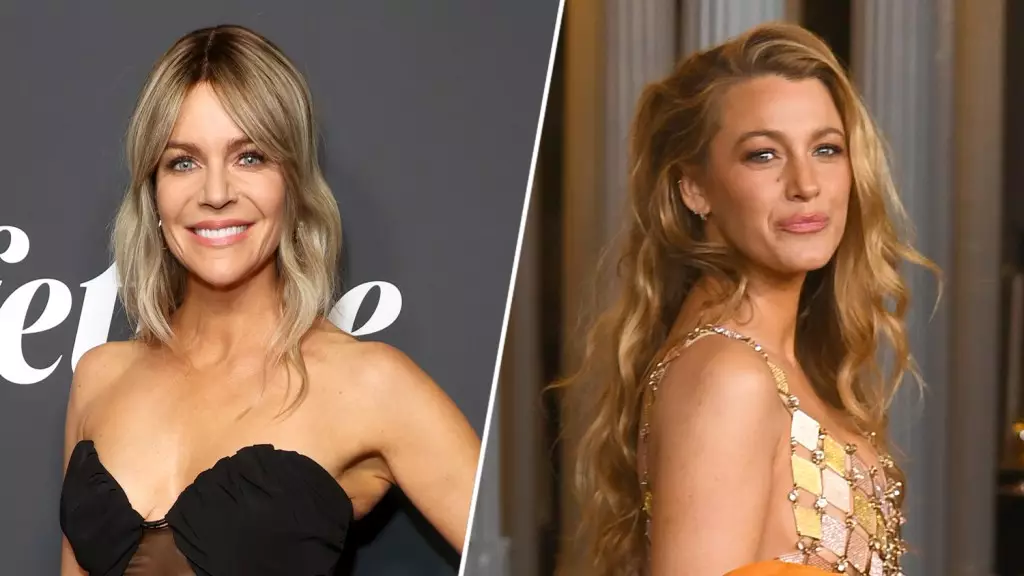In a captivating turn of events, actress Blake Lively has made serious allegations against Justin Baldoni, the director and co-star of the film “It Ends With Us.” Following her revelations about sexual harassment and retaliation, Kaitlin Olson emerged as a vocal supporter of Lively, describing her as “a kind, lovely, honest, and generous person” while noting her admirable qualities as a mother. Olson’s endorsement highlights the solidarity among women in the industry, showcasing how the effects of harassment transcend individual experiences and often foster a communal response. Olson’s husband, Rob McElhenney, co-owns the Welsh football club Wrexham A.F.C. with Ryan Reynolds, who is Lively’s spouse. This connection emphasizes the personal stakes in the unfolding drama, as both couples find themselves embroiled in contentious circumstances.
Lively’s accusations against Baldoni and his production company, Wayfarer Studios, are not merely personal; they are steeped in a power dynamic that resonates with many in Hollywood. She articulated her fight as a means to expose the “sinister retaliatory tactics” employed against those who dare to speak out about misconduct in the workplace. Her statements reveal how the repercussions of speaking out extend beyond the immediate controversy; they posit a broader narrative about systemic issues prevalent in the entertainment industry. Lively’s legal actions intend to shine a light on the tactics used to silence victims, thus igniting awareness and potentially sparking reform.
Baldoni’s response to Lively’s claims is marked by vehement denial. His legal team labeled the allegations as “completely false” and “outrageous,” suggesting a strategy aimed at damaging Lively’s reputation. The juxtaposition of their narratives echoes the issues surrounding accountability in Hollywood. It raises the question: how often do the abusers use their influence to dominate the narrative, undermining the voices of those who have experienced harassment?
The legal tug-of-war has escalated, with Lively filing a complaint that spans 80 pages, articulating a “hostile work environment” that she claims nearly jeopardized production. This is not just a legal battle; it represents the personal and collective struggles against entrenched behaviors in Hollywood. Lively’s reference to “Astroturfing”—a campaign that creates a façade of grassroots support—suggests that the media response to her accusations involves calculated manipulations designed to protect Baldoni’s image. The mention of text messages and communications between Baldoni and his associates lends a staggering amount of weight to her claims, painting a picture of a systematic effort to discredit her.
Moreover, the involvement of Stephanie Jones, the founder of Baldoni’s former PR company, indicates that the fallout is not contained to Lively and Baldoni alone. Jones has also filed a lawsuit against him, alleging defamation and breach of contract, showcasing how intertwined these narratives can become as multiple individuals grapple with the repercussions of such allegations.
This startling situation in Hollywood highlights an imperative need for a cultural shift within the industry. As Lively aims to use her experience to protect others who might be vulnerable to similar retaliations, it becomes evident that the stakes are not limited to individuals alone. The entire infrastructure of Hollywood is being tested, and the outcomes of these allegations may serve as a litmus test for the future of workplace culture in the industry.
As Baldoni prepares a counter-lawsuit, claiming Lively orchestrated a smear campaign, the developments underscore a larger theme: the perpetual cycle of allegations and denials that can overshadow the original intentions of victims seeking justice. The ensuing media frenzy and legal battles reveal a complex and often troubling interplay between truth, power, and public perception.
The saga surrounding Blake Lively and Justin Baldoni is more than a surface-level dispute; it reflects wider conversations about harassment, power dynamics, and the right to speak out. The implications of this case extend beyond the individuals involved, probing at the heart of an industry rife with inequality and misconduct. As more voices join the chorus in support of accountability, the ultimate resolution of this conflict could signal profound changes in Hollywood’s treatment of those who come forward with allegations.



Leave a Reply